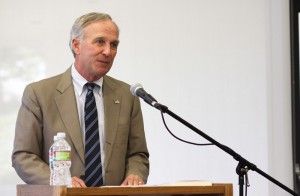
Nov. 11 is a date that carries a great amount of significance. It is not only the anniversary of the ceasefire of World War I, “the war to end all wars,” but also a time to observe and honor the veterans who have served to protect this country and its freedoms.
Pepperdine commemorated this Veterans Day with a special reading and lecture by Professor Dan Caldwell on his book “Vortex of Conflict.”
Caldwell is a distinguished professor of political science at Seaver College who has published multiple books and is a member of the Council on Foreign Relations. He is also chair of the council’s Academic Outreach Initiative.
His book, “Vortex of Conflict,” explains the origins of the Afghanistan and Iraq wars and demonstrates how intrinsically linked they are.
Caldwell began with the tradition of the citizen soldier, which has been passed down since the Roman Empire. These are the citizens that have been called to military service and to protect their country.
Moreover, his talk took place on “the 11th hour, of the 11th day, of the 11th month,” as Caldwell described it, to “commemorate those who landed on the beaches in Normandy.”
He also asked that those in attendance take a moment to show their appreciation to those among them who had served in any war.
In 2010, the conflict in Afghanistan became the longest American war in history, as it entered its 10th year. More than two million Americans have served in Iraq and Afghanistan, and more than 6,000 have died. “Society owes these warriors care and support,” Caldwell said.
For such reasons, the Pepperdine professor decided to donate the proceeds of “Vortex of Conflict” to the Wounded Warriors Project.
The Wounded Warriors Project was created to support the wounded soldiers returning home from active duty in any way they need. The project offer physical rehabilitation, as well as counseling services and employment assistance.
The difference between past wars and the current ones, according to Caldwell, is that presently civilians have been “relatively unaffected.” In modern society, army involvement is all volunteer-based, which leads to “higher professionalism, but less contact.
“I am concerned about the divergence in between these societies,” he said.
The political science professor’s book is the first that discusses both wars and their interrelation.
A consequence of the 2001 Afghanistan conflict was advancement in war technology that required fewer soldiers. Due to this, it was believed that not as many soldiers would be needed in the Iraq invasion and, consequently, 15,000 were sent, half of the recommended amount.
“In 2006, it was said that the U.S. was on the verge of defeat,” he continued, “and 30,000 additional soldiers were ordered.”
As a result, the government is now “essentially paying off Sunni tribesmen $300 a month not to kill them.”
Furthermore, the enemy also had time to develop new technologies and military strategies. In the early days of the conflict, the use of improvised explosive devices was nonexistent, and now it is the main weapon. There were no suicide bombers.
The wars have also had unintended political consequences, the main one being the rise of Iran.
George H.W. Bush did not have Saddam Hussein overthrown during the first Iraq war, in order to ensure Iran was “balanced with a relatively equal power. Now there is a power vacuum.”
Nevertheless, a relationship with Pakistan is key to the current situation according to Caldwell. The country is in possession of “more than 90 nuclear weapons, has a large contingent of extremist Islamic radicals and has a population equal to half the population of the U.S.,” Caldwell said.
However, presently, the state of affairs is not promising.
“The relationship is not going well,” he said. “Hopefully the governments will be able to focus on their common interests, such as maintaining the nuclear weapons and handling the extremists.”
Caldwell is optimistic for a positive outcome for Iraq, mainly because of its natural resources. However, he does not see things going as well for Afghanistan.
“It is my hope that the U.S. and the international communities will assist Afghanistan to develop economically, even in these dire times,” said the professor.

